Immigration

Joined by OneRepublic’s Ryan Tedder, Logic used his VMA stage time as a powerful protest of the Trump aministration’s family separation policy that has removed thousands of children from their parents.

A few weeks ago, I saw evidence that our government treats animals better than it treats immigrants. The U.S. Fish and Wildlife Service maintains a watering trough for passing cattle. This trough destroys gallons of water intended for human beings.
When I saw this injustice, I had already been in the desert for several hours in 110 plus degree heat. I was sweating profusely but I was chilled to the bone.
1. What Can Change in the Wake of the Pennsylvania Sex Abuse Report?
“I don’t know that [the Catholic Church can] come back from this, and I don’t know if they should.”
2. Do Religious People Know More About Politics?
This quick study ranks political knowledge by religious affiliation. Lookin’ at you, Episcopalians.

Over the past four months, news from the border has chronicled the stories of families detained and separated — many of them seeking asylum from gang violence in Central America. Children as young as 8 months have been taken from their parents and sent across the country to children’s shelters, privately run detention centers, and, some, to foster families. Now, 20 days after a court-imposed deadline, more than 550 children still have not been returned to their parents, at least 300 of whom have been deported.

“Abolish ICE” is no mere campaign slogan. It is a goal focused on dismantling a single young agency. I believe that, in its historical context, “Abolish ICE” is part of a larger vision to build a new a social order committed to the liberation of all.

While the INS’s mission was primarily to maintain control of the border and monitor immigration, the CBP’s mission aims to “safeguard America's borders thereby protecting the public from dangerous people”. The shift in mission from INS to CBP reflects an emphasis on anti-terrorism rather than immigration management.

Oliver-Bruno is one of six people publicly in sanctuary in the state (a seventh doesn’t want to be identified). During the 1980s, more than 100 churches sheltered Guatemalan and Salvadoran immigrants, and the movement has seen somewhat of a national revival in recent years. Though sanctuary churches often attract media attention, the men and women living behind church doors represent a network of families and communities living under the unpredictable threat of government-sponsored raids and arrests.

"Imagine your family ripped apart. That’s going to have reverberations across family members for years to come."
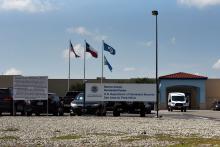
Immigrants have described the conditions in detention centers as “hieleras,” the Spanish word for ice boxes, and “perreras,” the Spanish word for dog pounds. In Laredo, Texas, a mother fleeing violence in Honduras with her two young sons said in a statement that they family was forced to sleep on the hard floor of the holding cell, clothes still wet from crossing the Rio Grande. Mothers also said they were given little to no food and are unable to produce enough breast milk to feed their children.
“It seems a new video emerges every week in the burgeoning genre of white people siccing police on nonwhite people for taking part in everyday activities … Now, some of the small but growing numbers of people featured in those videos are using the attention to run for office, become activists, form nonprofits or otherwise enter the fray of race, politics and social change.”
4. Is Neuroscience Getting Closer to Explaining Evil Behavior?
Why some people choose to do evil remains a puzzle, but are we starting to understand how this behavior is triggered?

A senior official at the U.S. agency charged with caring for migrant children believed separating them from their parents carried "significant risk" of harm and said on Tuesday concerns had been raised internally before the Trump administration made it official policy.
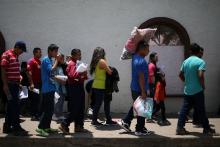
Lawsuits can force the government to change its policies, as has now happened with the apparent end to the family separation policy. But lawsuits do not always achieve the results intended. Since legal proceedings usually take years to adjudicate, they are often settled before running their course – well out of public view.

U.S. District Judge Dana Sabraw earlier this week praised the government's efforts to reunify some of the more than 2,500 children who had been separated from their parents upon crossing the U.S.-Mexico border in advance of the July 26 deadline. Yet as of that deadline, 711 children ages 5-17 remain in U.S. custody. Another 46 children under the age of 5 also have yet to be reunited with their parents
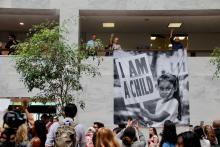
Earlier this week, it was reported that at least 460 parents may have already been deported without their children, leaving reunification possibilities unclear.

In a time when bipartisanship seems like a forgotten dream, it is important for us to find and celebrate cases of lawmakers coming together, regardless of party and ideology, to address the many real and immediate challenges we face as a country. Especially on issues of importance to the faith community, we should encourage bipartisan cooperation that seeks justice and mercy for families, communities, and those otherwise marginalized across our nation. Recently, there have been two steps forward on this front, especially with regard to the work that Sojourners has been doing on immigration, poverty, and racism.

OUR GOVERNMENT HAS taken the stance that Salvadoran “illegals” are economic, not political, refugees, and therefore have no right to be here. Despite stories and statistics to the contrary, our government doesn’t believe they have a “well-founded fear of persecution” that would entitle them to political asylum here. Meanwhile refugees keep coming with the same story of their government’s organized killing and repression. Where are our ears to hear and to respond? I am appalled at the inhumanity I see. I am standing in the belly of the beast, a monster we’ve created. ...
The core that sustains me is the still, small voice. It is God whom I wish to hear.

Apart from slogans, nothing seems different but license plates, laws governing cell phone use in moving vehicles, and the ability to buy liquor locally. If not for signs informing you of your whereabouts, you would not know the exact state you’re in. The mimosas bloom their otherworldly silken blossoms without deference to zip code. Catalpa leaves cascade like oversized green hearts from massive branches. Steeples rise from Baptist churches alongside Dollar Generals and barbecue places named for the folksy characteristics of those who ostensibly manage the pits. Heavy’s. Bubby’s. Grateful Ed’s. All of these things, the sweet smoky same, regardless of state line
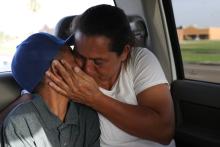
Marroquin Perdomo gave her son a set of colorful handmade cards she had made for him in detention. On one of them, she had drawn flowers surrounding a Bible verse – Salmos (Psalms) 121:8.
It reads in English: “The Lord will watch over your coming and going both now and forevermore.”
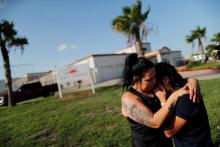
Chad Belew, pastor of The Arsenal, a non-denominational church south of downtown San Antonio, understands the pressure to keep a low profile on political issues or run the risk of alienating his congregation. But he also believes that silence is deadly, spiritually speaking. He quotes Martin Luther King, Jr. “Our lives begin to end the day we become silent about things that matter.”
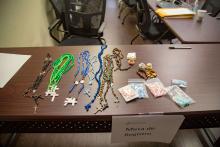
Parents who have just been reunited with their children — after being separated, some for months, amid the implementation of the Trump administration’s “zero tolerance” immigration policy — are offered food, clothes, toys, and other essentials and are paired with background-checked volunteers to help them through the next steps of the process.